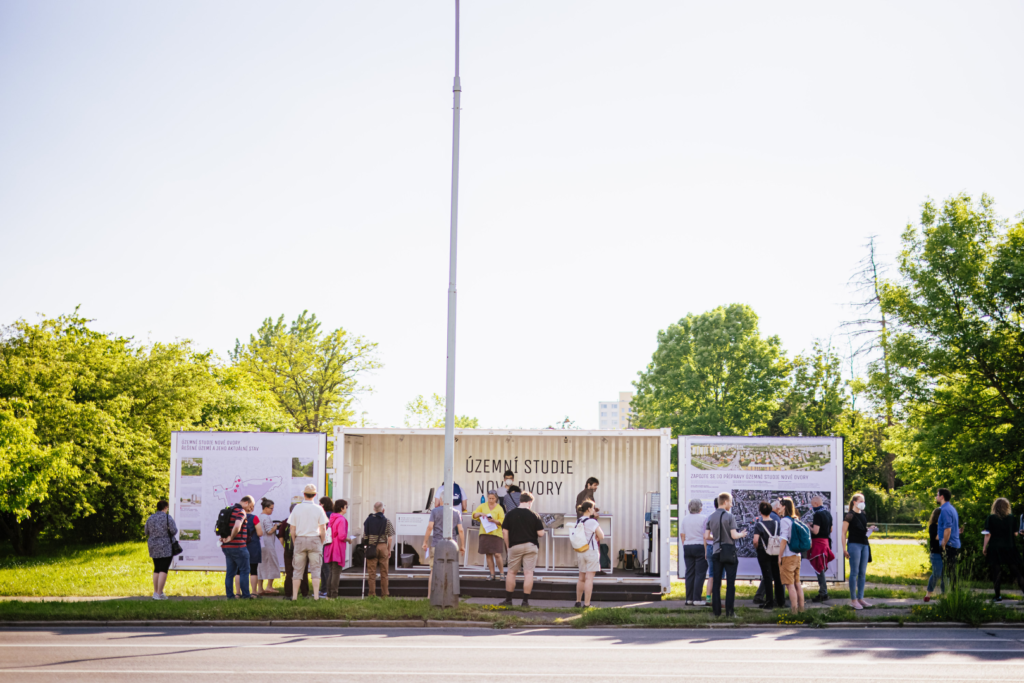The pilot program “Coordinators of Participatory Planning”, of which we were part of together with the Prague Institute of Planning and Development (IPR Prague), is slowly coming to its end. We have been involved in the implementation of this innovative program for two years, and we believe that its goal of anchoring participation in Prague as a standard approach has been achieved. Find out how the head of the IPR Prague Participation Office Milan Brlík perceives the whole program and what he considers to be the biggest challenges overcome and waiting ahead.

What are the biggest lessons learnt from the programme?
My personal lesson learnt is that when I am convinced of something I have to push through it, regardless of what my surroundings tell me. When you simply believe in something and it is based on data and experiences from abroad, you try to push no matter what. In terms of the program, and I didn’t know it would be so important, the lesson is that diagnostics of the borough is essential at the beginning and that finding a coordinator should be tailored for the borough based on the outcomes of the diagnostics. I thought the boroughs were much more similar, but they’re not. They are so different that a thorough diagnostics is really a must at the beginning. There is no single pattern.
What do you consider to be the biggest challenge of the program?
I guess it’s pushing the agenda through and constantly explaining that it’s needed. The deputy mayor Petr Hlaváček had to go around telling councillors that the city-wide program was a good idea, explaining what its benefits and advantages are. And that is a very difficult task. People do not realize the complexity of participatory planning, that it includes everything from strategic management and decision-making to the coordination of cooperation within and between offices and that cooperation with the citizens is only one piece of the puzzle. All of this is participatory planning. Unfortunately, many officials still have the misconception that participation means a participatory budgeting. This is as inaccurate as someone claiming that only one discipline, for example as tennis, is the whole Olympics. That would be a very poor Olympics. There are countless participatory disciplines, from public space planning and institutional coordination to the well-known participatory budgeting.
What challenge do you find the most common?
Changing the culture of cooperation within the authorities’ offices. The whole program is built on teaching authorities a new mode of cooperation but in a “real life environment”. Theoretically you can’t learn participatory planning, you have to experience it in a real project.
Did you experience anything unexpected during the programme? How did you deal with it?
There weren’t many negative things, mainly positive ones. For example, how quickly one of the coordinators jumped into his role – Karel Světlík (Prague 3) came in with some experience and grew into a total super hero of the officialdom. I was pleasantly surprised by the coordinators because each one of them has some super power. I was also surprised by the approach of the authorities. At the district offices, the coordinators were initially viewed as intruders, but very quickly they were able to convince the authorities of their role’s importance. And they also pleasantly surprised me as people. These types of positions don’t exactly attract careerists who are only looking for the money, but rather those who want to change the world for the better. They have faith in a better world.
How would you define the success of this whole-city programme? Can you name the top priorities for it before it comes to its end?
The success would be if, in five years, the city would be able to justify with participation-sourced data why a project is being done and make sure that it is thoroughly discussed before it is launched.
Assuming the program is going to continue and the number of KPP will grow, where do you see Prague in 5 years from now?
The ideal city of Prague would be the city in which, when a project is being done with either a larger or smaller investment, you know why it is being done. And you can be sure that it has been discussed between institutions, relevant actors, and important stakeholders. If someone pushes for a random project that they just thought of in the shower this morning or if they try to promote a project without any effort at strategic vetting, others will stop them. Both the Borough Office and the political representatives will automatically ask if the project is strategically needed and if it has been discussed with the public and other relevant institutions. Before the project starts, the investor will think about who the project will affect and how they will involve these people and institutions in the process.
If you want to find out more about the participation agenda or would like to implement it yourself, reach out to us via info@participationfactory.com

